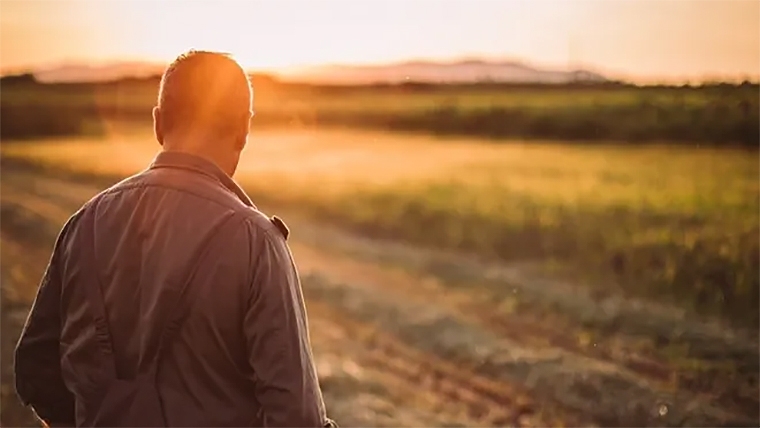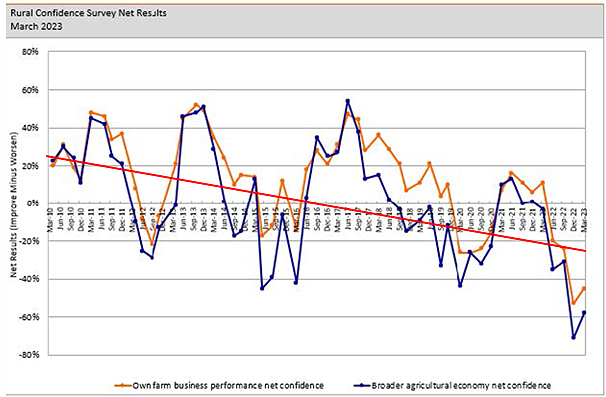
Two different reports from farmer organisations have been released in the last week or so. The first is from Beef+Lamb NZ and is their independent report by Meredith Connell on what emissions programmes may be considered workable. The second is the release of the mid-year Federated Farmers survey.
Starting with the survey results there are no surprises there. Broadly all the indicators that measure current economic factors are heading south. The most concerning is that from 3.5% last year farmers predicting to make a loss, this year it has leapt to 27%.
I have to wonder what other industry apart from the primary industry (as forestry may well be in a similar strait) would accept this as a part of doing business (Covid-19 aside). The scary thing is that the survey was done prior to Fonterra’s -$1.00 per MS drop in their forecast. At the very least it will be ‘interesting’ to see the response of banks and politicians to the results. To date I’m yet to hear/see a response from either group.
“The four biggest concerns for farmers were debt, interest and banks, regulation and compliance costs, and climate change and ETS policy.” Interestingly all of the points of concern with the exception of “climate change” are areas which are directly influenced by banks and politicians. Only 29% expected to show a profit (again, before the latest dairy price reduction).
The survey’s findings:
- 81% of respondents considered current economic to be bad. 1% considered them to be good. This results in a net rating of negative 80% That’s 15 points worse than in the January 2023 survey, when a net negative 65% score.
- This is the lowest level of confidence in economic conditions recorded in Federated Farmers surveys that have been conducted twice a year since 2009.
- 29% of respondents reported making a profit, 27% reported making a loss, resulting in a net 1.8% of respondents currently making a profit. This is a sharp decline from July 2022 when 72% were making a profit and only 3.5% were making a loss.
- Profit was lowest in the Meat & Wool sector. Note this survey was done before the recent forecast downgrade by Fonterra.
- 3% of respondents thought economic conditions would improve in the next 12 months compared to 73% who thought they would worsen. This results in a net-confidence rating of negative 70%. This is a little better than in January but is only because more people thought it would stay the same rather than any pick-up in those thinking it would improve.
- Just 4% of respondents expected their profitability to improve over the next 12 months, while 74% expected it to reduce. This results in a net-negative 70% profitability expectations score.
- Worryingly, 22% of respondents expected to reduce production in the next 12 months while only 14.5% expected it to increase. This results in a net negative 7.5% score for production expectations. It is the third survey in a row where production expectations have been negative.
- 45% expected to reduce spending in the next 12 months compared to 35% who expected to increase spending. This results in a net negative 11% score for spending expectations.
The greatest concerns for farmers were:
- Debt, Interest & Banks
- Regulation & Compliance Costs
- Climate Change Policy & ETS
- Farmgate & Commodity Prices
The top priorities for government action were:
- Economy & Business Environment
- Fiscal Policy
- Disaster Recovery
- Climate Change Policy & ETS
No great surprises except the order has had a bit of a re-juggle. Farmers are also expecting no respite with over 90% either expecting things to worsen or at best stay the same.
Rabobank also conducts regular surveys’ and their last one’s results were released in June. The graph below was from March data and confirms what the Fed Farmers ones shows. Confidence plummeting.

Source: Rabobank (trendline mine)
Interestingly the Rabobank survey found “Positively, this survey found the proportion of farmers rating their own business as ‘easily viable’, ‘viable’ or ‘just viable’ was up to 95 percent (from 94 percent previously),” Given the trends at least since 2017 either some farmers are deluding themselves or there must have been some sunny weather or something the day the survey was conducted. Either way both surveys show anything but a viable industry if confidence is anything to go by.
The Fed Farmers have also released a report which lays out what it believes it will take in the form of government policies to help farming regain some of the lost ground.
Federated Farmers 12 policy priorities for the next Government:
- Support better use of technologies
- Unlock potential through water storage
- Allow young farmers to access their KiwiSaver
- Urgently review our methane targets
- Rethink our ETS Forestry Rules and net-zero target
- Scrap the Ute tax and fix our infrastructure
- Give back control to local communities
- Fix our unworkable freshwater rules
- Get RMA reform right
- Simplify Significant Natural Areas
- Build the farmer workforce
- Show fiscal and monetary discipline.
Also, as new President Wayne Langford points out "The best thing about our policy priorities is that they won’t cost the taxpayer a dollar. We’re just asking for the government to get the settings right so farmers have the confidence to invest, grow, and get on with what they do best - farming."
Perhaps the question he should be raising is whether or not it will win whichever party(s) gets into power at the next election, will it gain more votes than it loses? We seem to have slid into the unpleasant realm of populist politics more than ever before. I mentioned the 1956 PM Walter Nash (Labour) last week. His ‘notoriety’ was for introducing the “Black Budget” (1958) as he had the audacity to raise taxes on cigarettes. Hasn’t the worm turned.
12 Comments
The only economic bright spot for hill country farmers is planting trees for carbon income to help with fertilizer, fencing etc.
The feds want to axe that as well!
I wonder what their stance on planting fodder trees are , poplars at a fairly low stems per acre qualifies for ETS, and provides fodder.
The govt was also supposed to be looking at a scheme for willow to be brought into the scheme. Presumably at a lower rate.
Farmers should just give up and become teachers. That seems to be an economic bright spot.
On another note. That FF wish list reads a lot like an entitlement to pollute.
Gotta agree with your last paragraph, never have I been so disillusioned with the offerings of the main parties.
Is the centre so pasty as they seem to think, surely the majority can see times are going to be tough,and its not the time for lolly scrambles.
Well one party still thinks its the 1950s and the other one is so scared of offending anyone, it offends everyone. Absolute dross is the most complimentary description I can bare to express.
It will cost the taxpayer plenty if we have to start buying carbon credits overseas. but that's not the farmers fault, they are a partial solution , through the ETS.
Lol Allow young farmers to access their KiwiSaver
My opinion is that all but the first 3 points on Federated Farmers 12 policy priorities for the next Government are wishful thinking, wanting free lunches from the environment they have unwittingly and previously exploited for free, to the detriment of the natural world that sustains us. For examples Give back control to local communities and Fix our unworkable freshwater rules are blithe simplistic platitudes that scarcely conceal the future consequences of BAU, and won't make them go away - like floods, droughts, crop failures, poisoned rivers and coastal estuaries. That this wish list is directed at the next government, and not what farmers and their Federation can do for themselves is an abdication of personal responsibility.
I wonder what the relationship is between NZ's production , and the WMP price. Are we big enough that reducing our production will make the WMP price go up ?
Good point solarb, would be interesting to see, but I doubt it. There has often been surplus dairy in the world remember the huge butter mountains in Europe and NZ making milk biscuits to give away in Africa.
Those things tasted terrible, poor Africans.

We welcome your comments below. If you are not already registered, please register to comment
Remember we welcome robust, respectful and insightful debate. We don't welcome abusive or defamatory comments and will de-register those repeatedly making such comments. Our current comment policy is here.